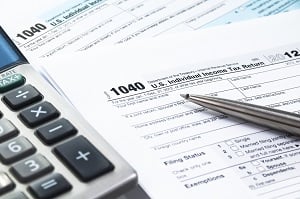 Every year, the IRS collects over $3 trillion. Given the size of this revenue stream, many people think that the Service will overlook a few thousand dollars in unpaid taxes here or there. But that’s definitely not the case. The IRS is, in effect, the world’s largest bill collector. And this agency has access to many tools that private debt collectors can only dream about.
Every year, the IRS collects over $3 trillion. Given the size of this revenue stream, many people think that the Service will overlook a few thousand dollars in unpaid taxes here or there. But that’s definitely not the case. The IRS is, in effect, the world’s largest bill collector. And this agency has access to many tools that private debt collectors can only dream about.
Bankruptcy is usually the best way, and sometimes the only way, to keep the IRS at bay. As outlined below, it gives families breathing space and also permanently eliminates tax debt in many cases.
There is more good news. Many people get to keep their hard-earned tax refunds, even though this cash may technically be a nonexempt asset.
Unpaid Taxes and the Automatic Stay
Typically, once the IRS determines that a person owes a tax liability, the Service sends a series of collection letters. Usually, each one is more ominous and threatening than the previous one. The end result of these letters is generally an adverse action like:
- Wage garnishment,
- Account levy, or
- Refund intercept.
Bankruptcy’s automatic stay halts all these adverse actions. While the case is pending, creditors cannot communicate with debtors. That will give families time to catch their financial breath if tax collection has become an issue. And our office can help communicate with the IRS if that is in your best interest. While the IRS won’t speak with you, your attorney can reach out to the IRS to see if a repayment schedule is available to a debtor who has tax debt that will not be discharged in a bankruptcy.
Minnesota Bankruptcy and IRS Debt Discharge
In many cases, the IRS cannot begin collections activities anew once the case ends. That’s because in many situations, bankruptcy wipes out IRS debt. As one might expect, there are several requirements:
- Income Tax: Only personal, and sometimes corporate or partnership, income taxes are dischargeable. Trust fund debts are not dischargeable, and neither are property taxes or any other kind of taxes.
- No Fraud: There is a difference between mathematical mistakes and intentional fraud. Many times, the IRS uses 10 percent as a rule of thumb. Anything less may be an innocent mistake; anything greater was probably fraudulent.
- Three Years: The taxes to be discharged must be at least three years old. And the three years is measured from the last day taxes were due – not the day the tax return was actually filed. The bankruptcy court uses the date the bankruptcy petition was filed in calculating the three years and not the date of the discharge. Furthermore, Tax Day is not always April 15. Some people get extensions, and sometimes Tax Day falls on a Sunday or a holiday.
- Two Years: Taxpayer-filed returns must have been on file for at least two years prior to the bankruptcy filing date. It does not matter whether these returns were timely filed or not.
- 240 Days: This last hurdle trips up a lot of people. The IRS must not have assessed the debt in the last 240 days. In everyday English, that usually means the Service has not sent a letter in the last eight months. Not all correspondence counts as an “assessment.” Your attorney can usually distinguish between assessment and non-assessment letters.
If the IRS has already filed a tax lien, bankruptcy will not discharge the lien even if it discharges the debt. Bankruptcy judges are not technically civil court judges, so they have limited powers.
A brief word about tax refunds. Sometimes, debtors can exempt these refunds if they declare them in the Statement of Financial Affairs and have adequate room under the federal wild card exemption. But even in other cases, the trustee may not take action. As a rule of thumb, if the refund is less than $100, the trustee allows the debtor to keep it. That knowledge may affect your income tax planning.
If your income tax debt is not dischargeable, there may be an available non-bankruptcy option, such as innocent spouse forgiveness, a payment plan, offers in compromise or CNC (Currently Not Collectible) status. We can handle these situations for you or refer you to a Minnesota tax attorney.
Bankruptcy’s fresh start often includes tax debt forgiveness. For a free consultation with an experienced bankruptcy attorney in Minnesota, contact Kain & Scott. We have offices in Minneapolis, Maple Grove, St. Cloud, Roseville, Lake Elmo, Eden Prairie, Duluth, Brainerd, and Eagan.



